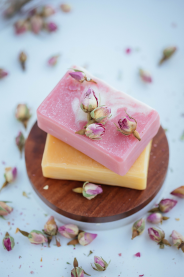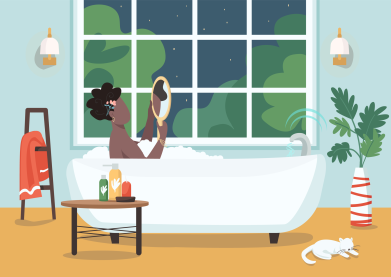1: Walk among the autumnal landscape
The woods provide the perfect backdrop for an autumn walk, with an array of rich colours and woodland creatures. Why not take a walk there and check out the nature happening around you? Here are some free resources to inspire you to do so.
-
Outdoor Therapy: The Benefits of Walking and Talking
Read now to access more details of Outdoor Therapy: The Benefits of Walking and TalkingAn area that has been of particular interest is providing traditional talking therapy outdoors. This article explores the pros of connecting with the natural world...

-
Neighbourhood nature
Learn more to access more details of Neighbourhood natureThere is a fascinating world of nature all around us which we can see if we know how to look for it. Wherever you live, be it in a city or the countryside, you will find areas that support a range of wildlife. This free course, Neighbourhood nature, will provide you with basic scientific and observational skills so that you can go into your ...

-
Exploring oak woodland
Listen now to access more details of Exploring oak woodlandOak woodland is a characteristic feature of the English landscape and home to a huge variety of plants and animals. On this album, Professor David Streeter of the University of Sussex explores some characteristic features of an English oak wood, and reveals some of the processes that maintain the web of life within the wood. In three further ...

2: Make the most of the night sky
October provides the Orionids and the Draconids – the perfect opportunity for stargazing. Just wrap up warm and sip on hot chocolate while you gaze upwards. Learn more about the stars and planets with the learning materials below.
-
In the night sky: Orion
Learn more to access more details of In the night sky: OrionIn this free course, In the night sky: Orion, you will explore the night sky, discover how stars formed and find out about exoplanets, all through the constellation of Orion.

-
Astronomy with an online telescope
Learn more to access more details of Astronomy with an online telescopeThis free course shows you how to navigate the night sky, and introduces the wide variety of objects it contains. You will develop a hands-on understanding of telescopic observations using the Open University’s own robotic telescope facility COAST sited on the island of Tenerife. Supported by your own measurements we illustrate how stars...

-
Galaxies, stars and planets
Learn more to access more details of Galaxies, stars and planetsThis free course, Galaxies, stars and planets, is a general introduction, including scale of the universe from the very large to the very small; orbits and gravity; the Solar System; the Sun and other stars; galaxies and the composition of astronomical objects.

3: Curl up with a good book
There’s nothing better than staying cosy indoors on a rainy autumn day with a new book to occupy your mind. We’ve got some inspiration for you in the boxes below.
-
Introducing the psychology of our relationships with fictional villains
Learn more to access more details of Introducing the psychology of our relationships with fictional villainsThis free course, featuring interviews with famous crime fiction authors, explores psychological theory and research on the relationships we form with fictional characters.

-
Harry Potter and the Translator’s Challenge
Read now to access more details of Harry Potter and the Translator’s ChallengeHow did translators go about converting the anagram 'Tom Marvolo Riddle'? Fernando Rosell-Aguilar explores the tricky business of translating J.K. Rowling's fun and creative words into 80 other languages.

-
Exploring Virginia Woolf’s Between the Acts
Learn more to access more details of Exploring Virginia Woolf’s Between the ActsThis free course introduces Virginia Woolf’s last novel, Between the Acts (1941), with the aim of understanding how she writes about time, memory, and ideas about identity. It also considers why Woolf’s fiction is often considered difficult. Selected extracts from her essays on writing help to clarify some of these perceived difficulties, ...

4: Devour your favourite food
Pumpkin soup or pumpkin pie may come to mind when you think of this season. However, we say just eat what you enjoy – whether that’s being healthy or indulging in some pizza or chocolate.
-
The science of nutrition and healthy eating
Learn more to access more details of The science of nutrition and healthy eatingExamine the science behind nutrition, covering aspects of biology, chemistry and physics as well as giving some insight into healthier eating. Reading food labels, choosing healthier foods, hydrating appropriately and understanding how we taste food will allow you to be more informed about the choices you make about the food you eat.

-
Ever Wondered About... Pizza?
Read now to access more details of Ever Wondered About... Pizza?Delve into the history and science of pizza - you know you want to!

-
The science of chocolate
Watch now to access more details of The science of chocolateSenior lecturer in analytical science Claire Turner asks: Can chocolate ever be good for us?

5: Lose yourself in a mystery this autumn
Dark nights, darker plots! Get cosy, press play, and step into the world of crime and intrigue. You can learn about crime, whodunnits, and the science and history behind them.
-
Agatha Christie and the golden age of detective fiction
Learn more to access more details of Agatha Christie and the golden age of detective fictionIn this free course you’ll examine one of Agatha Christie’s most significant works, The Murder of Roger Ackroyd (1926), and explore the evolution of British detective fiction in relation to Christie’s background, literary modernism and the development of middlebrow fiction.

-
Crime scene officer
Take part now to access more details of Crime scene officerPut yourself in a crime scene officer's shoes and try to solve a suspected murder when time and resources are tight. Can you link the suspects to the forensic evidence?

-
Hat makers, Greek gods and the great poisoners
Read now to access more details of Hat makers, Greek gods and the great poisonersEver wondered where the phrase 'as mad as a hatter' came from? We take a look at some infamous cases of poisoning.

6: Get creative indoors
As the days grow shorter, autumn is the perfect time to pick up a new hobby or craft. Whether that's writing a novel by the fire, or tackling a DIY project, making something with your hands can be both relaxing and rewarding.
-
Start writing fiction: characters and stories
Learn more to access more details of Start writing fiction: characters and storiesStart writing fiction is a free course that helps you to get started with your own fiction writing, focusing on the central skill of creating characters.

-
Design thinking
Learn more to access more details of Design thinkingAre you ever frustrated with something that you thought you could design better? This free course, Design thinking, will show you how to structure your natural creativity to come up with solutions to all kinds of problems, and have fun in the process too!

-
DIY: Make Your Own Soap
Read now to access more details of DIY: Make Your Own SoapA step-by-step guide to making soap.

7: Take time to reset
Autumn invites us to slow down, recharge and adapt to the shorter days. Whether it’s practising mindfulness, getting outside for daylight, or finding balance in your daily routine, this season is perfect for nurturing your wellbeing.
-
Five reasons why you should care about mindfulness
Read now to access more details of Five reasons why you should care about mindfulnessMindfulness is about focusing on the present moment, whilst at the same time accepting your feelings, thoughts, and body’s sensations. But why does mindfulness matter?

-
Five tips on how to plan new self-care routines
Read now to access more details of Five tips on how to plan new self-care routinesDr Sharon Mallon explores what is meant by self-care before introducing you to some of the top inexpensive and time-effective ways that you can introduce self-care practices into your life.

-
Exercise and mental health
Learn more to access more details of Exercise and mental healthEach year thousands of pounds are spent on medications to treat conditions such as anxiety and depression. These medications often have negative side effects. Exercise is an alternative treatment that is low cost and has few side effects. In this free course, Exercise and mental health, we will look at the links between exercise and improved ...

8: Celebrate the major autumnal events
Celebrate the major autumnal events, from Halloween to Bonfire Night. We even have an article related to Thanksgiving for those of you who call this season ‘fall’.
Get ready to explore the spooky, the strange, and the supernatural! Dive into our fang-tastic collection of articles, podcasts, and free courses all about Halloween, death, fear, and the paranormal. Pretty ghoul, huh? Ever wondered about the science behind fireworks? Each type of firework has a slightly different design and ingredients - learn how the various explosions and colours occur. The turkey is a fascinating bird - and demands more respect than a bit of stuffing and a spot of cranberry. Ricki Lewis explains more
Happy halloween!

The chemistry of fireworks

Talking turkey: 12 facts about turkey genetics

9: Pay attention to nature
It’s an exciting and somewhat difficult time for the animal kingdom. Our free courses on hibernation, migration and surviving the winter are perfect for you to study from the comfort of your home in the ’ber months.
-
Animals at the extremes: hibernation and torpor
Learn more to access more details of Animals at the extremes: hibernation and torporHibernation is an ingenious adaptation that some animals employ to survive difficult conditions in winter. This free course, Animals at the extremes: hibernation and torpor, examines the differences between hibernation and torpor, and discusses the characteristic signs of hibernation behaviour. It explores the triggers that bring on hibernation,...

-
Migration
Learn more to access more details of MigrationMigration is a free course looking at the migrations of animals, with special reference to birds, and also introducing the themes of movement, selection and homeostasis.

-
Surviving the winter
Learn more to access more details of Surviving the winterIn this free course, Surviving the winter, we study one aspect of the fluctuating nature of an organisms environment. We consider how organisms living in a temperate climate, such as that in Britain, are adapted to cope with winter. You will see that there is much diversity of adaptations among organisms, with different species coping with the ...

10: Engage with the arts
A trip to the cinema, theatre or an art gallery is an ideal activity on a cold or grey day. Or you can check out these free arts resources with a gothic or autumnal theme, below.
How have the seasons been represented in art over the centuries? These films explore this question by analysing paintings by famous artists from Bruegel to Van Gogh as well as some less well-known works. Stephanie Forward outlines the life and legacy of the author of 'Frankenstein', Mary Shelley. How Ken Russell’s Gothic foregoes radical politics in favour of sex and necromancy.
The Seasons in Art

Mary Shelley: the expert view

Horror and politics


Rate and Review
Rate this article
Review this article
Log into OpenLearn to leave reviews and join in the conversation.
Article reviews